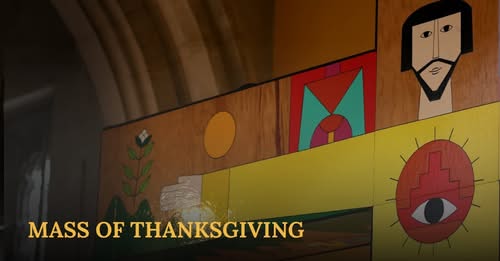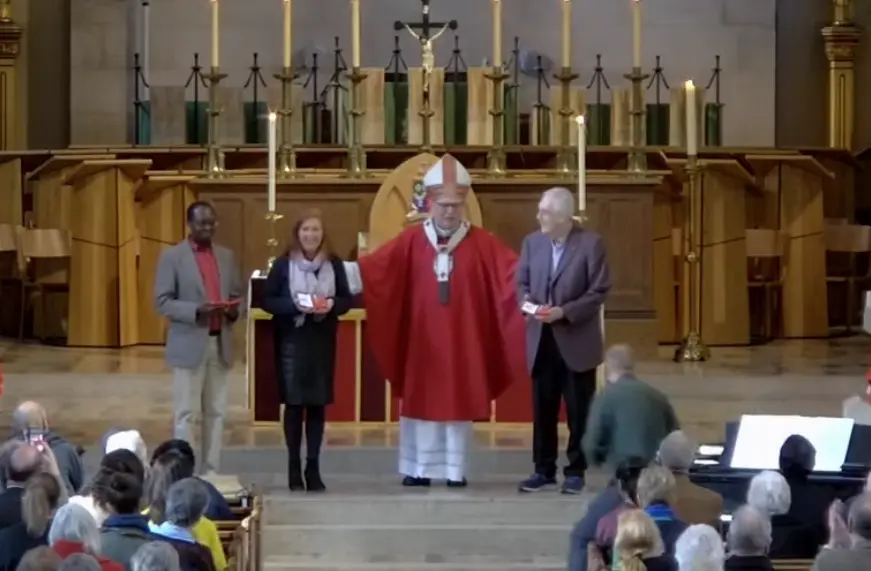Mass of Thanksgiving 1st November 2025

On Saturday 1st November Archbishop John Wilson celebrated a Mass of Thanksgiving at the National Shrine to Saint Oscar Romero in St George's Cathedral, Southwark to mark the 20th anniversary of the Archbishop Romero Trust and 10th anniversary of the Oscar Romero Award Trust.

Archbishop Wilson's Homily
Romero Mass of Thanksgiving Celebrating the 20th anniversary of the Archbishop Romero Trust (2005 – 2025) and the 10th anniversary of the Oscar Romero Award Trust (2015 – 2025) – 1 Nov 2025 - Hebrews 10:32-36 · Psalm 125(126) · Luke 24:13-35
Dear brothers and sisters in Christ
If you didn’t know it already, like so many of you, I am an enormous Romero fan. Not because I am sentimental or nostalgic, but because his example inspires me – inspires us all – to take Christ seriously and ask what his Gospel means for today, especially in relation to people experiencing poverty and oppression.
In his first Apostolic Exhortation On Love for the Poor – Dilexi te – Pope Leo holds Romero before us as a bishop who “made his own the plight of the vast majority of his flock and made them the centre of his pastoral vision.” This is a rallying call to every parish, school, and diocese; to everyone baptised into Christ, and all who are consecrated or ordained to serve: to make our own the plight of our people.
In Eastertide 1978, our beloved Archbishop Romero preached on what he called the “charming passage” about the disciples on the road to Emmaus. He summarised it with words from a communion hymn popular at the time:
“A pilgrim journeyed with me on the road to Emmaus. As we walked I did not recognise him,
but when he broke the bread,
I realised it was the Lord who was walking with me.”
The Emmaus story presents the Christian life as a journey of faith and faithfulness, two essential words for understanding Romero. He lived these with, and for, his people. In life, and in martyrdom, he was a faith- filled and faithful “pilgrim into hope.” He is calling us to do the same, making our own the plight of our people.
San Romero is with us spiritually today. If he was here in person I imagine him, gently, but firmly, asking us: Are you really pilgrims into hope with Christ, for yourself and your people? And, perhaps, even more directly: If you really are pilgrims into hope, show me the evidence? It wouldn’t just be words that satisfied Romero. He would want something incarnated and put into action. In this Jubilee year, how are we pilgrims into hope with Christ, and how would anyone be able to tell?
Commemorating twenty-first century martyrs in Rome recently, Pope Leo quoted Romero who preached: our God “is a God who wants to be with men [and women], a God who feels the pain of those who are tortured and killed, a God who restores faith in the Church. He is a living God, who feels, acts, works, and guides this history, and in him we hope, in him we trust.”
God walking with us in Christ underpins Romero’s ministry, martyrdom, and legacy. “For by His incarnation,” teaches the Second Vatican Council, “the Son of God has united Himself in some fashion with every person.” For Romero, this was the foundation of transformative Christian hope, something far greater than cheerful optimism or wishful thinking. Romero preached the distinctively Christian hope rooted in the word becoming flesh in Jesus Christ and culminating in his saving death and resurrection. He was utterly convinced that the Easter mystery either changes everything or it means nothing.
Christian hope desires the blessedness of the kingdom of heaven and eternal life. It means trusting Christ’s promises, relying on his strength, not our own. For Romero: “Christ alone is the source of our hope and our security. This is our project of salvation.”
Romero grasped and lived the fundamental importance of hope in Christ and grappled with its implications. He believed that a better, fairer, more peaceful world was possible, where the Beatitudes map out our shared existence, where the truth of the Gospel and human dignity are honoured, where, in solidarity, we make our own the plight of our people.
Christian hope impelled Romero to critique the violent injustice that destroyed so many Salvadoran lives during the civil war. “Christian Hope,” he preached, “is the great Key to Our True Liberation … The goal of our hope is the kingdom of God.” He continued, “It is the kingdom of God that Christ came to establish in our time … the seeds of eternity are already there in the human hearts that hope and believe in our Lord.”
Romero knew that Christian hope is absolutely about eternal life in Christ. But, also, that it has to find anticipation here and now, in this present life: the hope for faith, justice, peace, and respect for human life and dignity. “We have a great hope,” said Romero “that God moves with us in our history.” The Christian hope that points us to heaven also urges us to implement its consequences on earth where Christ lives with us in his Spirit.
In this light, hope and liberation are bound together in Christ. Romero rejected “a revolutionary liberation of an earthly sort.” He comments that the two Emmaus disciples were disillusioned precisely because their human hope in Christ as a purely earthly liberator had seemingly come to nothing.
Liberation through “violence and hatred and class struggle,” said Romero “… is not the liberation of Christ;” it is foolishness and slowness to believe. Why? Because, the primary liberation is redemption in Christ: “liberation from sin, liberation that enables us to break completely the chains that bind us tight,” … liberation which “assures for us the holy freedom of the children of God.” Yet, of critical significance for Romero, “redemption is being worked out.” In us, and in our world, redemption inspires our hope so that we make human liberation effective in a truly Christian way.
This was Romero’s vision. There had to be real and tangible impact for the weakest, the poorest and those suffering oppression and injustice. If we really are pilgrims into hope, what difference are we making to the poor? How is the resurrection inspiring us to raise up the downtrodden? How are our efforts at justice and peace effective in a truly Christian way? Without compromise, Romero lays this before us.
Romero’s belief that Christ is walking with us in history made the Emmaus story so “instructive” for him. Christ jokes with the two disciples, he said, “playing ignorant,” pulling their leg, pretending not to know what has happened in Jerusalem. “Are you the only visitor in Jerusalem,” says Cleopas, “who does not know the things that have happened there in these days?” To which the Lord Jesus responds masterfully, “What things?”
On so many different levels, it was an incredible thing for Our Lord to have said. Knowing, literally first-hand, everything that happened in Jerusalem, he is more interested in hearing the disciples’ story before telling his own, even though his story is the most fantastic Good News imaginable, the greatest story ever told.
In that simple phrase - “What things?” - one word, ποίά, in Greek, a life- changing truth about our relationship with the Lord Jesus is revealed. And it provides the model for our relationships with each other. Our Lord and God does not presume that what he has to say is of such importance, even though it is, that he cannot first listen. How important this is for a synodal Church.
The risen Lord Jesus invites us to engage our hearts in plain-speaking to his heart. In response, the Emmaus disciples tell their story of faith; and the Lord Jesus listens. From their perspective, seen through their eyes and felt through their hearts, he waits patiently to hear what they have to say. And then he opens the Scriptures and explains away their foolishness, bringing them to a new place of understanding and mission.
For the Emmaus disciples, and for us, the encounter with Christ finds its fulfilment in the Eucharist, where Christ is recognised as truly present in the broken bread that has become his body. The Eucharist, preached Romero, “is the presence of the merciful love which, in Christ, redeems the world.” This merciful love draws us closer to the Lord and to each other. It is in this strength that we make our own the plight of our poor and suffering sisters and brothers.
Romero’s prophetic courage sprang not from ideology but from his intimacy with Christ. He was “a man of prayer, kneeling before the tabernacle before he ever spoke before the crowd.” Romero’s diaries reveal how all his decisions began in the stillness of the chapel. As a young priest he wrote on the day of his ordination: “O Jesus, faithful friend, let me never betray the sweetness of your love… Sooner death than that this love should grow cold.” It was this love – Eucharistic, cruciform, and intimate – that became the compass for Romero’s priesthood and episcopate. It was this love that enabled Romero to make his own the plight of his people. It was this love that made him the voice of the voiceless and the shepherd who laid down his life for his flock.
When I visited the small rooms where Romero lived at Divine Providence Hospital, I was struck by its austerity: a bed, a desk, a few books and belongings, his rosary, his typewriter. It is a portrait of humility. As I recalled in my journal at the time, “Everything is simple. Nothing fancy. Nothing unnecessary. Christ and his people were his solace.” If we are open to learn, this teaches us everything.
To the Eucharistic altar we bring ‘what things’ are in our hearts for our Church and our world and those in need. From the Eucharistic altar we are sent out, carrying “seeds of eternity,” ready to serve God’s Kingdom. If we can, even momentarily, make the suffering plight of another person our own, we have begun to comprehend Romero and the Christ he loved.
Through the intercession of this great saint, may we be given the grace to recognise Christ in the breaking of bread; to carry him in the breaking hearts of our world, and to live, like Romero, as pilgrims into hope – disciples of the crucified and risen Lord, whose love alone endures forever. Amen
The Most Reverend John Wilson Archbishop of Southwark

